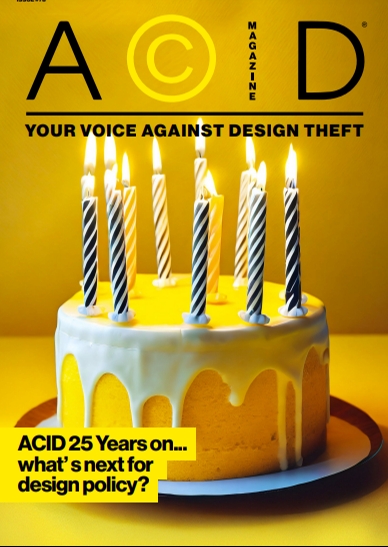Posted by Danielle Harvey on 22 May 2024

ACID's creation marked the beginning of a relentless battle against industry giants shamelessly copying designs from smaller studios. Over 25 years, ACID has championed thousands of designers, advocating for originality, and combating design theft. There have been hundreds of settlements on behalf of its members reinforcing the ACID brand of deterrence and prevention. In 2014, our efforts culminated in a significant milestone—the introduction of criminal offences for intentionally copying registered designs, enshrined in the IP Act.
Design law reform
Despite this achievement, challenges persist. Many UK designers rely on unregistered rights, and the complexities of design law continue to pose hurdles. ACID remains committed to campaigning for design law reform, calling for the criminalisation of unregistered design infringement to level the playing field for creators. ACID constantly questions the inconsistency in the unlevel playing field for 2D and 3D design copying. For example, if someone steals the plans/drawings (a copyright work) it is a crime but when a new 2D product emerges from those plans and is copied, it is not a crime. It doesn't make sense.
A robust intellectual property framework is crucial for the design sector's success, especially in an industry contributing significantly to the UK economy. ACID's survey reveals that 90% of respondents view copying as blatant and deliberate, reinforcing the need for ongoing efforts to combat design theft. Before a much-needed government designs' consultation this year, ACID is collaborating with the UK Intellectual Property Office design team to work towards cost-effective access to justice and raise awareness about the stress caused by consistent infringement on lone, micro, and corporate design businesses.
Artificial intelligence
ACID's discussions extend to the realm of artificial intelligence (AI), emphasising the necessity for high-level principles for AI avoid copyright infringement. We are calling on the government to establish clear principles for AI developers, including those working on large language models (LLMs). Online infringement remains a concern, and ACID advocates for enforcing "Know Your Business Customer" (KYBC) obligations with dissuasive financial penalties for non-compliance. ACID's manifesto outlines its achievements, from lobbying for an IP Minister to influencing legislative and non-legislative changes and creating alternative dispute resolution protocols. To offer help and support for online infringement, ACID has teamed up with Snapdragon Monitoring to give its members access to a cost effective and fast track service to stop copies and counterfeits discovered online.
As we look to the future, ACID's newly created IP Charter stands as a beacon, championing the cause of design originality and intellectual property protection in the giftware sector and beyond. Compliance, ethics, and respect are the principles guiding a growing number of UK designers engaging with ACID's mission. Have you signed?
To find out more, visit www.acid.uk.com